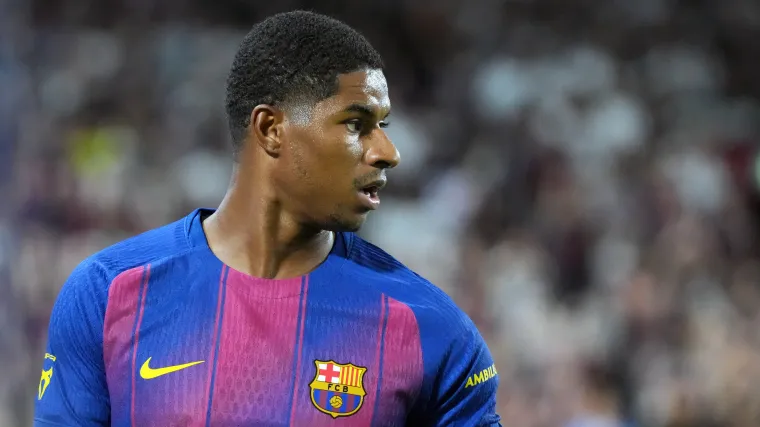The name Rashford has long conjured images of relentless energy, goal-scoring prowess, and youthful brilliance—yet his recent journey in Barcelona’s La Liga 25-26 season has been anything but smooth. Once heralded as a vital addition to Barcelona’s attacking lineup, Rashford has found himself mired in disappointment and growing scrutiny. His potential departure looms as a stark reminder of how even the brightest stars can dim under the weight of unmet expectations, especially when political moves and player performance collide on the grand stage of football.
In this detailed exploration, we’ll analyze the swirl of events surrounding Rashford’s stint at Barcelona, from his initial signing to the mounting frustrations within the club, and what the future might hold for this talented English forward. As the team faces internal pressure and external criticism, the spotlight intensifies on Rashford to reignite his form or risk returning prematurely to Manchester United. This comprehensive deep dive offers insights into the complex realities of modern football transfers, player adaptation, and the unforgiving environment of top-tier La Liga football.
More Xavi Simons – Tottenham Hotspur’s Creative Catalyst for the 2025-2026 EPL Season
The Rise of Rashford – A Dream Move with High Expectations in La Liga 25-26

The summer of 2025 marked a significant chapter in Rashford’s career. Having established himself as a prolific scorer and versatile attacker at Manchester United, his decision to embrace a new challenge in Spain was seen as a logical step to elevate his career further. Barcelona, eager to bolster their front line after the departure of key players and with the goal to reclaim dominance in La Liga 25-26, swooped in with high hopes and a pragmatic transfer plan.
With a loan agreement that included an option to buy outright for €30 million, Rashford was anticipated to bring a fresh burst of energy, creativity, and goal-scoring ability to a team attempting to rebuild under Hansi Flick. The player, known for his agility, tactical intelligence, and adaptability, was expected to seamlessly integrate into Barcelona’s attacking schemes and become a cornerstone of their future plans. His previous exploits with England and Manchester United had generated considerable buzz, making him one of the marquee signings of the transfer window.
However, expectations clash sharply with reality once the games begin. As the initial optimism began to fade amidst a challenging start, doubts crept in both from fans and club officials—that the investment might not yield the desired results. Rashford’s move was driven by ambition; yet, the realities of adapting to a new league, system, and club environment often come with unforeseen hurdles. His arrival in La Liga 25-26 was supposed to transform Barcelona’s attack, but early signs suggested a different story—to the growing dismay of supporters and management alike.
The Disappointing Start: Rashford’s Struggling Campaign in La Liga 25-26

While the summer transfer seemed promising, the early performances of Rashford in Barcelona’s La Liga 25-26 campaign have been underwhelming. After three matches, he has yet to register a goal or assist—something unheard of for a player of his caliber, especially considering his reputation for clutch performances and goal-scoring consistency.
This lack of impact has sent ripples through Barcelona’s dressing room. As fans clamour for former United star to find his footing, internal frustrations are bubbling to the surface. There’s a palpable sense that Rashford, despite his attacking versatility, has yet to adapt fully to the demands of the La Liga style—characterized by intricate build-up play, high pressing, and tactical fluidity.
Many analyses suggest that Rashford’s initial struggles can be attributed to several factors: unfamiliarity with the team’s tactics, the pressure to perform immediately in a highly scrutinized environment, and perhaps even a misalignment of playing style with his natural strengths. His darting runs and direct approach, highly effective in the Premier League, are not translating seamlessly into the tactical fabric of Barcelona’s current playing style.
Moreover, the psychological toll of not meeting expectations has begun to surface. The club’s internal confidence in his ability is waning, as evidenced by reports that some players and coaches have expressed reservations about his adaptation. This situation underscores how football today is as much about mental resilience as it is about technical skill—a lesson Rashford is nowhere near mastering in his current environment.
The Growing Tension Within Barcelona’s Dressing Room – Concerns Rise Over Rashford’s Future

As weeks pass with no goals or decisive contributions, internal concerns within Barcelona are escalating. The dressing room, once hopeful about Rashford’s potential, is now riddled with doubts about his acclimatization and long-term fit. Some teammates reportedly find his form inconsistant and his integration slow, echoing sentiments from past high-profile loan players like Joao Felix, who struggled to live up to expectations during his stint at Camp Nou in 2023/24.
These issues have begun to influence team dynamics. Confidence, which is vital in a squad aiming for a La Liga title or Champions League success, appears shaken. Players are questioning whether Rashford’s current performances reflect a deeper inability to adjust or merely a temporary dip. As team coaches focus on rebuilding the attack strategically, Rashford’s role has come under increasing scrutiny—raising questions about whether he will be able to turn things around fast enough.
The club’s management and coaching staff are reportedly divided. While some see potential in Rashford’s raw talent, others believe that his slow adaptation could destabilize their planning for the season. The comparison to Joao Felix’s struggles has been inevitable—highlighting how high-profile loans often come with added pressure to perform beyond expectations. This internal discord signals that Rashford’s future at Barcelona hinges critically on his ability to produce results soon, or risk becoming another short-lived tale of unmet promise.
The Threat of Contract Termination – Barcelona’s Souring Confidence in Rashford
Given the current trajectory, the threat of a premature exit looms large. Reports indicate that Barcelona is considering a drastic yet costly option: terminating Rashford’s loan agreement and returning him to Manchester United in January 2026. This possibility, though financially burdensome, underscores the severity of their dissatisfaction.
The club faces a significant penalty if they breach the agreement early—specifically, paying MU a fee of approximately €5 million for breaking the contract. This financial aspect adds another layer of complexity to what could become a high-stakes gamble. Yet, the club appears to prioritize squad harmony and project success over financial loss if Rashford continues to underperform.
This situation also casts a shadow on Rashford’s reputation, as early failure can tarnish perceptions among fans and media alike. For the player, returning to Manchester United unexpectedly could be both a relief and a setback, forcing him to confront questions about his form, confidence, and future prospects.
The decision to end the loan prematurely reflects Barcelona’s pragmatic approach—prioritizing immediate results over long-term potential if the current scenario persists. This makes Rashford’s immediate challenge even more urgent: to prove his worth or face the possibility of an early return home, confusing the narrative of his career resurrection abroad.
The Pressure Mounts – Rashford’s Future and The Need for Rapid Resurgence in La Liga 25-26
Since arriving in Spain, Rashford has been under immense scrutiny from the coaching staff, media, and fans. With Barcelona in a rebuilding phase under Hansi Flick—focused on restructuring the squad and implementing a more cohesive attacking philosophy—the pressure on individual players like Rashford is intense. His ability to rise to this challenge will define not only his tenure in La Liga 25-26 but also his broader career trajectory.
The team’s strategic focus on finding a reliable target man or creative winger means Rashford’s performances will be scrutinized heavily. Despite his numerous qualities, he must adapt quickly to La Liga’s tactical nuances—a league renowned for its technical focus and emphasis on ball retention. His initial lackluster performances suggested a disconnect, urging him to improve both his decision-making and physical conditioning to meet the league’s demands.
Off the field, Rashford faces the mental challenge of rebuilding confidence. The spotlight will remain intensely fixed on him for the foreseeable future, with mixed expectations from fans and pundits alike. A surge in form during the upcoming fixtures could turn the tide and confirm his value in Barcelona’s plans. Conversely, continued underperformance risks pushing him further toward an early return to Manchester United, once again raising questions about player adaptation in top European leagues. His scenario underscores how high the stakes are when transitioning between leagues with differing styles, expectations, and pressures.
The Broader Context – How Rashford’s La Liga Adventure Reflects Modern Football Dynamics
Rashford’s brief but tumultuous stint at Barcelona exemplifies broader themes that define contemporary football. The transfer market today isn’t just about player skills; it’s a complex equation involving cultural fit, tactical compatibility, media pressure, and psychological resilience. His case illustrates how even highly talented players can struggle when their environment doesn’t align with their strengths or when external factors overshadow performance.
Barcelona’s strategic pursuit of Rashford was driven by a desire to inject youth, versatility, and goals into their squad after previous unsuccessful attempts to sign other targets like Luis Diaz or Nico Williams. The club’s willingness to pay a hefty loan fee and a potential buyout clause indicates their serious intent—but also highlights the risks involved when expectations are set without considering the player’s readiness for a new league’s demands.
On a broader level, this scenario raises questions about how clubs factor in personal adaptation when acquiring international stars and how players handle the transition from familiar environments to foreign leagues. Rashford’s experience demonstrates that success isn’t guaranteed simply by talent; it requires support, patience, and tactical harmony. His situation is a mirror to modern football’s climate, where the pressure to deliver immediately can sometimes overshadow long-term development.
Moreover, this case underscores the importance of cultural and environmental integration. The club’s internal tension and the reports of a tense dressing room showcase how fragile team chemistry can be—especially when star players underperform. It also highlights how clubs are increasingly managing transfer risks by including clauses that allow early termination, reflecting the volatile nature of high-stakes football.
Conclusion
Rashford‘s journey through La Liga 25-26 encapsulates a compelling narrative of expectations, adaptation, and pressure in modern football. What began as an optimistic pursuit to revitalize his career in a prestigious European league has now become a cautionary tale about the perils of high-profile transfers and the relentless demand for immediate results. Barcelona’s internal struggles, coupled with Rashford’s personal challenges to adapt to a new tactical environment, have cast a shadow over what was initially seen as a promising move. As internal tensions mount and the club considers costly options like early contract termination, the spotlight remains firmly on him—to find his form swiftly or face an unexpected, early return to Manchester United. Ultimately, his future hinges on his ability to overcome these hurdles, proving once again that in football, talent alone is seldom enough without resilience, adaptability, and a touch of luck.

